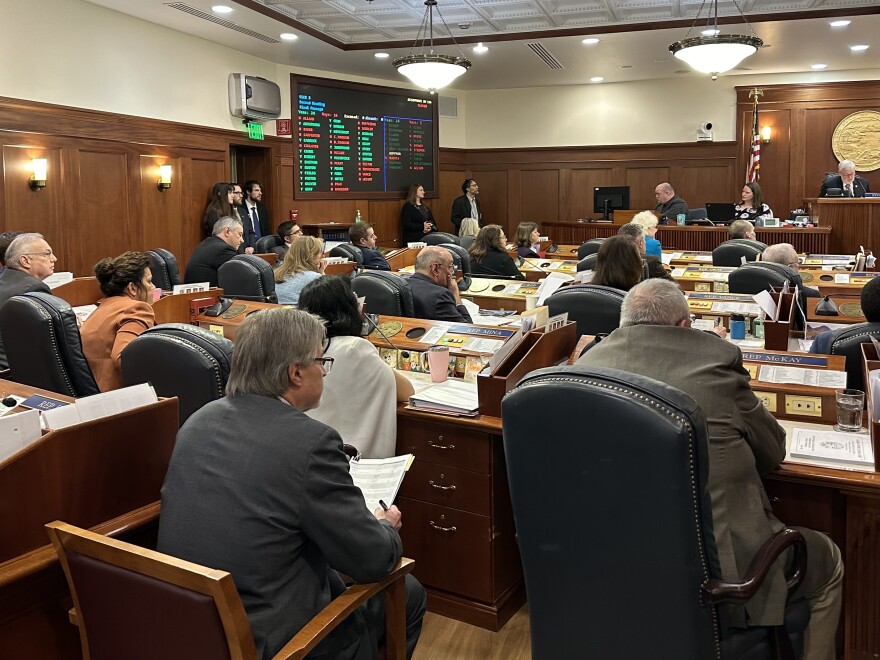The Alaska Legislature rejected eight executive orders issued by Gov. Mike Dunleavy in lengthy joint session on Tuesday.
Typically, the Legislature writes bills and sends them to the governor for approval or veto. But on Tuesday, the process worked in reverse: Lawmakers were the ones pondering their veto power over a dozen executive orders issued by Dunleavy.
Senate President Gary Stevens, R-Kodiak, underscored the governor’s historic use of executive power.
"The Legislature has never considered 12 executive orders during one floor session, as we will be doing today," Stevens said.
Dunleavy’s 12 orders make up nearly 10% of the total number of executive orders issued since statehood. Most of his orders would have transferred the functions of various boards and commissions to the executive branch.
The Alaska Constitution allows the governor to reorganize the executive branch to provide for “efficient administration," but it also gives lawmakers a chance to vote them down — something they hadn’t done in nearly 30 years.
Lawmakers voted unanimously to uphold two of the governor’s orders. They eliminate the Alaska Council on Emergency Medical Services and the Criminal Justice Information Advisory Board. The latter board hadn’t met in years, Sen. Matt Claman, D-Anchorage, said.
But lawmakers were far more skeptical of other orders. Rep. Bryce Edgmon, I-Dillingham, urged lawmakers to reject an order that would have eliminated the management council that oversees Wood-Tikchik State Park in Southwest Alaska. He said the council has been an integral part of the park since its inception in 1978.
"The agreement back then with then-Gov. (Jay) Hammond and his administration was that an independent advisory body would be set up to ensure that traditional hunting and fishing rights would be overseen and protected and that there'll be a proper balance with sports fishing and recreators going into time," Edgmon said. "It's been around for 50 years. The park itself has worked beautifully."
The joint House and Senate voted 38-21 to reject the order. Lawmakers then rejected another order that would have eliminated the Alaska Chilkat Bald Eagle Preserve Advisory Board, 40-19.
And it was a similar story for an order that would have allowed Dunleavy to appoint all nine members of the Alaska Marine Highway Operations Board. The board advises the administration on how to operate the ferry system. Currently, four members are appointed by leaders of the House and Senate.
The Dunleavy administration told lawmakers the board was dysfunctional and resisted department leadership. But Rep. Louise Stutes, R-Kodiak, who helped craft the board, argued a little discord can be a good thing.
"This is a very successful board with a diverse group of board members with diverse ideas," Stutes said. "This, to me, is exactly what we're looking for: a group of people that do not all think alike and are able to think outside the box and ask tough questions."
The feeling was not unanimous. Rep. Kevin McCabe, R-Big Lake, who chairs the House Transportation Committee, said he agreed that the Legislature should have some input on the future of the ferry system, but spoke in support of the restructuring.
"I think that the governor deserves to have a board that supports his vision for the Marine Highway System," McCabe said. "I don't think it's all that different from our vision."
Lawmakers ultimately rejected the reorganization 33-26.
Lawmakers also rejected three orders that would have eliminated the regulatory boards for barbers and hairdressers, massage therapists and midwives.
Sen. Jesse Bjorkman, R-Nikiski and chair of the Senate Labor and Commerce Committee, said midwives had come out in force to oppose the order.
"We heard about the desire from midwives for their profession to be regulated and have a board that represents them professionally in what those regulations are and what those folks are able to do," Bjorkman said.
The Legislature also nixed a proposal that would have allowed the commissioner of the Department of Fish and Game to craft regulations for "live capture, possession, transport, or release of native or exotic game or their eggs." That’s currently the prerogative of the Board of Game. Sen. Bill Wielechowski, D-Anchorage, argued the board’s yearslong public process is essential to preventing invasive species from taking root in Alaska.
"I trust this commissioner will conduct a robust process, but I don't know who the future commissioner will be that will be running this process. And quite frankly, on decisions of this magnitude, I'd rather have a more dispersed decision making process, then the decision being made by one political appointee," he said.
Lawmakers also rejected an order that would have split the boards of the Alaska Energy Authority and the Alaska Industrial Development and Export Authority. The two state-run enterprises currently share a board. Though lawmakers said they’re open to the idea, legislative attorneys raised concerns about the constitutionality of the executive action.
Just four of Dunleavy's orders survived — the two mentioned earlier, plus one that eliminates the Alaska Safety Advisory Council, which holds an annual workplace safety conference, and the Susitna Basin Recreation Rivers Advisory Board, which provides input on the management of six Southcentral rivers. Mat-Su lawmakers offered nearly unanimous support for eliminating the board, which they said was standing in the way of development.
In an interview shortly after the votes, Wielechowski said lawmakers considered all of the orders on their own merits — but there was something of a theme.
"I think it's Alaskans being concerned about consolidation of power in one individual or one department, and I think really an appreciation of these checks and balances that we have in our governmental system," he said.
Dunleavy’s press office had a different take, issuing a brief statement after the series of votes.
“The purpose of the executive orders was to check the growth of government and improve efficiency,” spokesperson Jeff Turner wrote in an email. "Therefore, the Dunleavy administration will continue to forward executive orders that streamline government and make it more efficient.”


